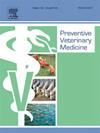Perspectives on the social sciences in global animal health governance: A qualitative study of experts
IF 2.2
2区 农林科学
Q1 VETERINARY SCIENCES
引用次数: 0
Abstract
A global discourse continues to emphasize the importance of integrating the social sciences into health governance and systems research, including in the global animal health sector. By comparison to human health, however, it is unclear how far this discourse has changed institutional practices in animal health and what opportunities exist to strengthen this integration. We conducted a qualitative study to address these knowledge gaps, based on 29 semi-structured key informant interviews (KII) with experts involved in the global governance of animal health and biosecurity across five regions between November 2022 and June 2023. Inductive thematic analysis was used to analyse results, which were triangulated with findings from primary and secondary data sources. We divide our analysis into three sections: 1) governance landscape; 3) prioritization; and 3) the role of social science. First, we found that KII consider the global animal health governance landscape shaped by five main actor networks who operate under different institutional norms and mandates: international organizations, bilateral donors, the private sector, national governments, and regional organizations. Informants believed that bilateral donors have disproportionate levels of control and influence; national governments struggle with realistic fiscal planning; engaging the private sector remains challenging; international organizations exhibit tensions in their conflicting mandates; and regional organizations need to be more involved. Second, we found that the key priorities of the actor networks were influenced by core uncertainties and tensions. This included different narratives about risk and methods of risk assessment; conflicting values between health and economic development; and capacity scale problems between global and local networks. The field is perceived to be dominated by the global health security agenda and international trade, and disproportionately focused on pandemic threats. Third, we found that barriers to the integration of social science included disciplinary boundaries, given the dominance of the veterinary sciences; the preponderance of instrumentalized goals; and structural conditions that limited opportunities for knowledge translation. Overall, we found that while the social sciences are increasingly part of a global discourse improving global animal health governance and systems, their current application appears to be of limited range and effectiveness. Coordinated investment in truly interdisciplinary networks, with sufficient disciplinary independence, may help address these problems.
全球动物卫生治理中的社会科学视角:专家的定性研究
全球讨论继续强调将社会科学纳入卫生治理和系统研究的重要性,包括在全球动物卫生部门。然而,与人类健康相比,尚不清楚这一论述在多大程度上改变了动物健康的体制做法,也不清楚存在哪些机会来加强这种整合。在2022年11月至2023年6月期间,我们对五个地区参与动物卫生和生物安全全球治理的专家进行了29次半结构化关键线人访谈(KII),并进行了一项定性研究,以解决这些知识差距。归纳主题分析用于分析结果,这些结果与主要和次要数据源的发现进行了三角测量。我们将分析分为三个部分:1)治理前景;3)优先;3)社会科学的作用。首先,我们发现KII考虑了全球动物卫生治理格局,这是由五个主要行为体网络形成的,它们在不同的制度规范和任务下运作:国际组织、双边捐助者、私营部门、国家政府和区域组织。举报人认为,双边捐助者的控制和影响程度过高;各国政府努力制定切合实际的财政计划;吸引私营部门参与仍然具有挑战性;国际组织在相互冲突的任务中表现出紧张;区域组织需要更多地参与进来。其次,我们发现行动者网络的关键优先级受到核心不确定性和紧张关系的影响。这包括对风险和风险评估方法的不同描述;健康与经济发展的价值观冲突;以及全球和本地网络之间的容量规模问题。该领域被认为是由全球卫生安全议程和国际贸易主导的,并且不成比例地侧重于大流行威胁。第三,我们发现,鉴于兽医学的优势地位,社会科学整合的障碍包括学科边界;工具化目标的优势;结构条件限制了知识转化的机会。总体而言,我们发现,虽然社会科学越来越多地成为改善全球动物卫生治理和系统的全球话语的一部分,但它们目前的应用范围和有效性似乎有限。对真正的跨学科网络进行协调投资,并具有足够的学科独立性,可能有助于解决这些问题。
本文章由计算机程序翻译,如有差异,请以英文原文为准。
求助全文
约1分钟内获得全文
求助全文
来源期刊

Preventive veterinary medicine
农林科学-兽医学
CiteScore
5.60
自引率
7.70%
发文量
184
审稿时长
3 months
期刊介绍:
Preventive Veterinary Medicine is one of the leading international resources for scientific reports on animal health programs and preventive veterinary medicine. The journal follows the guidelines for standardizing and strengthening the reporting of biomedical research which are available from the CONSORT, MOOSE, PRISMA, REFLECT, STARD, and STROBE statements. The journal focuses on:
Epidemiology of health events relevant to domestic and wild animals;
Economic impacts of epidemic and endemic animal and zoonotic diseases;
Latest methods and approaches in veterinary epidemiology;
Disease and infection control or eradication measures;
The "One Health" concept and the relationships between veterinary medicine, human health, animal-production systems, and the environment;
Development of new techniques in surveillance systems and diagnosis;
Evaluation and control of diseases in animal populations.
 求助内容:
求助内容: 应助结果提醒方式:
应助结果提醒方式:


